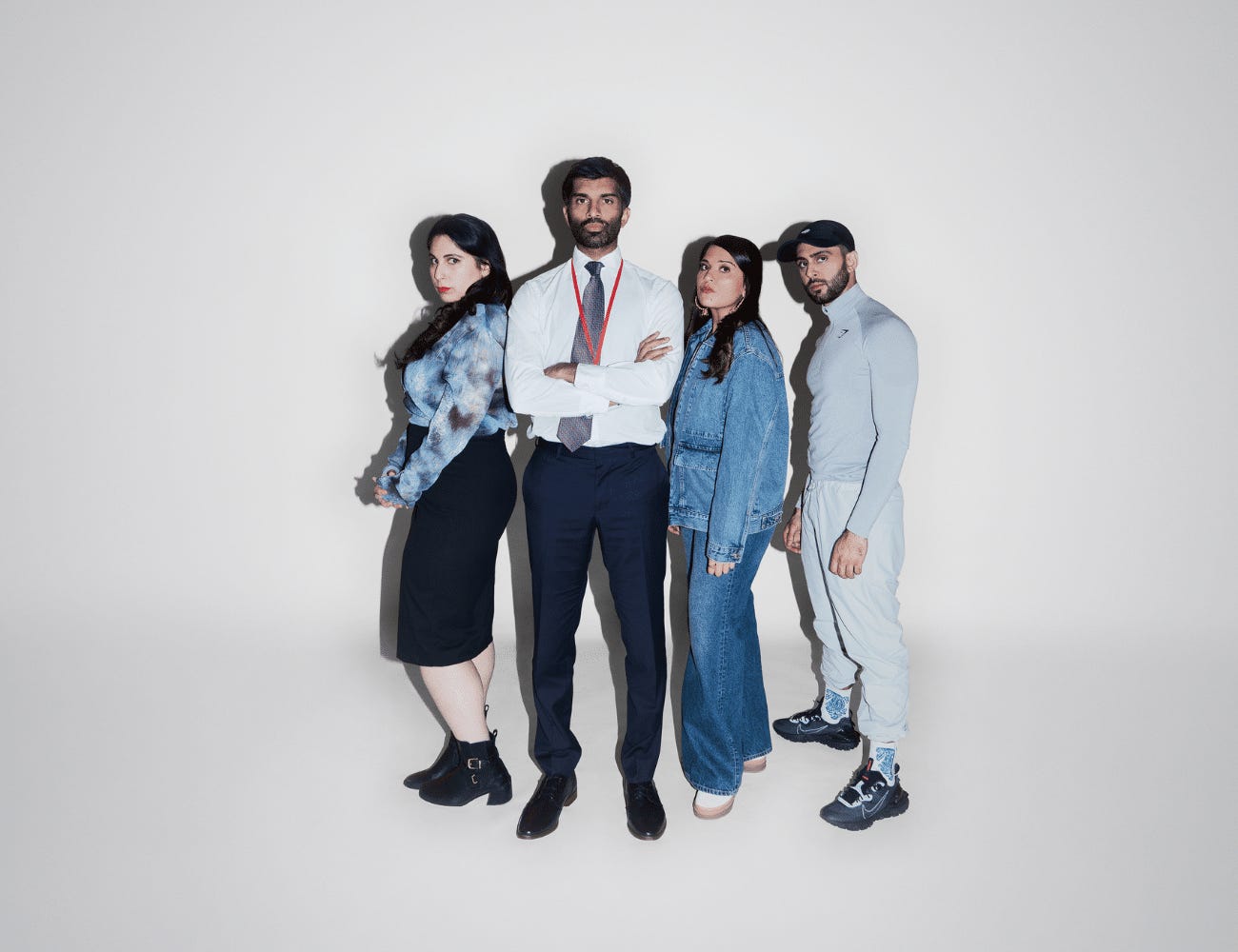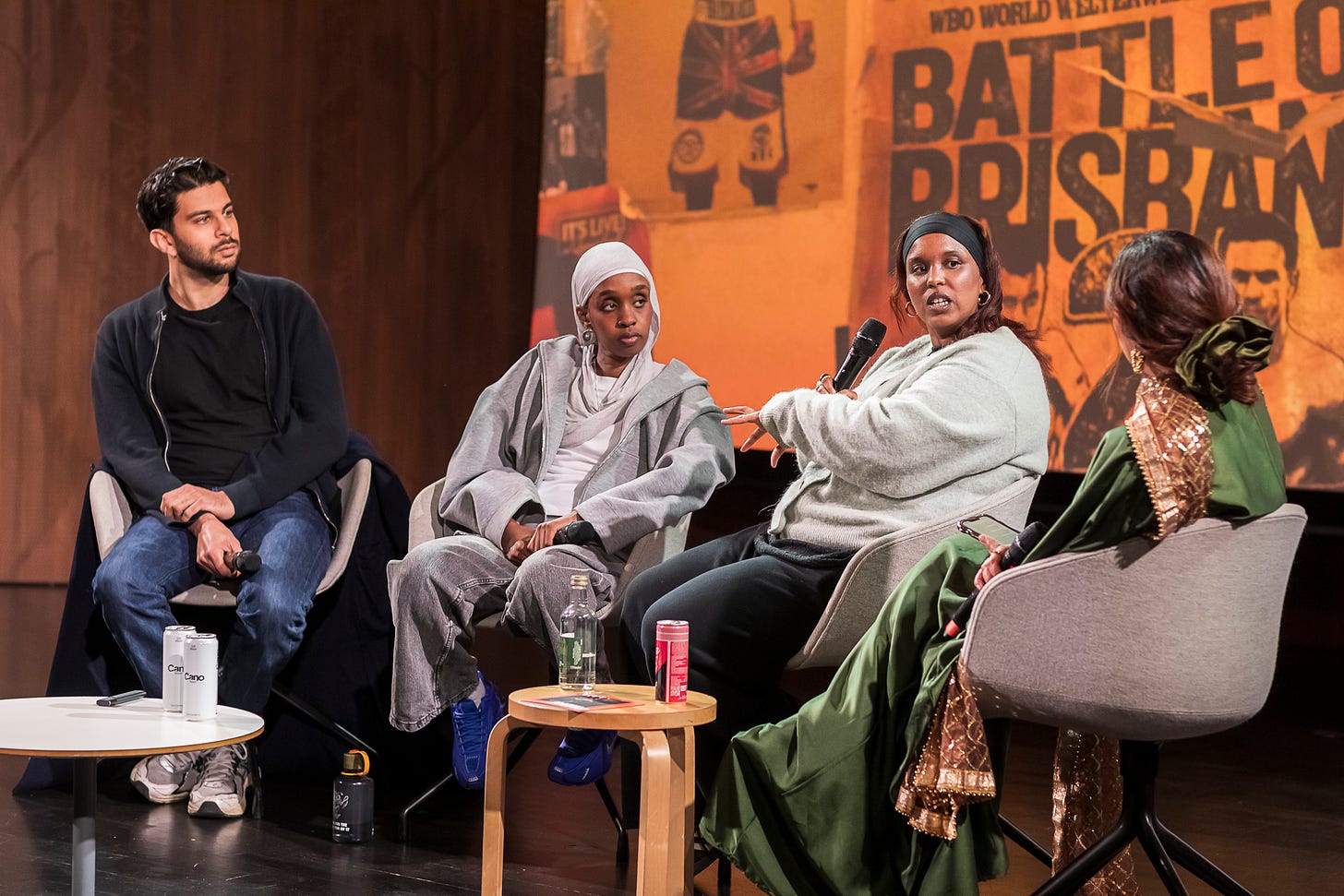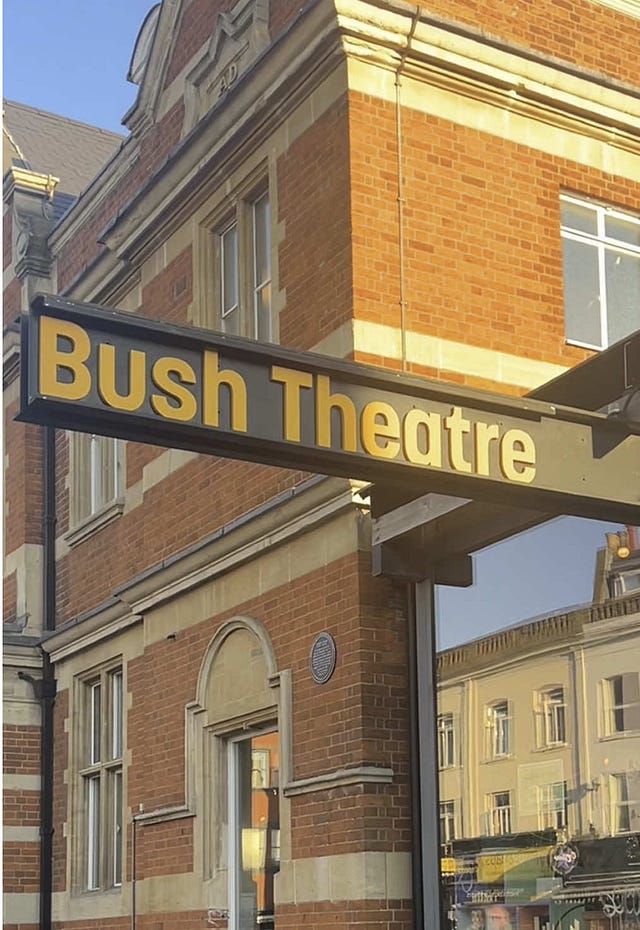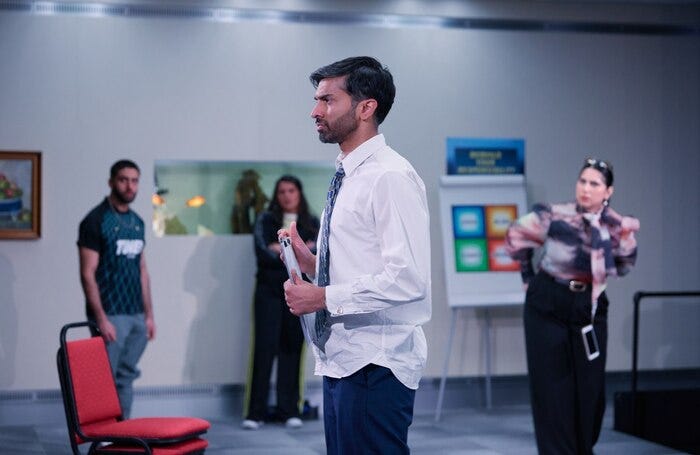From Notes App to Stage: The Making of 'Speed'
Our chat with Mohamed-Zain Dada + an exclusive 20% discount for you
Last week we had the pleasure of catching Speed, Mohamed-Zain Dada’s third full-length play, at the Bush Theatre in Shepherd’s Bush.
We were excited to see Mohamed-Zain’s latest work after having him join our V&A Late back in February, where he spoke on a panel about curating narratives and his work as a scriptwriter. His work consistently holds a mirror to the realities faced by the South Asian and Muslim diaspora in the UK, and Speed is no exception.
Set in the basement of a Holiday Inn in Birmingham, Speed follows three individuals attending a speed awareness course led by the hilariously pedantic instructor, Abz. What starts as a mandatory session quickly unravels into something more like group therapy — a space where deeper stories emerge around identity, belonging, and survival.
We caught up with Mohamed-Zain after the show to hear more about the six-month journey of bringing Speed from page to stage.
‘Speed’ is your third full-length play after the success of Blue Mist—congrats! Where did the initial spark for this story come from, and how long was it brewing in your mind before it made it to the stage?
I was really interested in the idea of the car as a source of our passive aggression and outright aggression in a similar way to how the internet functions. We're increasingly living atomised and highly individualised lives, and I think the road and the internet share a lot of commonalities - the ability to abuse a stranger and retain anonymity, for example. I then started to reflect on British stoicism and how it's sometimes weaponised to 'dull' our impulse to speak out when the world is on fire. The poet, Lisa Luxx describes the slogan "keep calm and carry on" as a form of "psycho-social neutering," and something about that really captivated me. I remember writing all the ideas down in my notes app on my phone in December 2023.
How do you strike the balance between telling a personal, culturally specific story and navigating stereotypes?
I start any writing process with the intention of doing it for the sake of Allah swt - it really helps answer the question: ‘Why am I doing this and for what purpose?’
In terms of cultural specificity, I'm aware that there are people who don't see the humanity in certain people or characters whether on stage, screen, or even in media reportage. So there is a tremendous amount of care and responsibility that goes into cultivating both the story and particularly the characters. Luckily, that burden isn't all on me. I worked closely with director Milli Bhatia to discuss the nuances of each character in each and every draft as well as the dramaturg for the show, Titilola Dawudu. As we entered the rehearsal room, it also became a live conversation with the actors, Sabrina Sandhu, Arian Nik, Nikesh Patel and Shazia Nicholls. They were all brilliantly generous, engaged and articulate in expressing the truth of their characters that informed the frantic re-drafting that got us across the line.
You’re working with the brilliant Milli Bhatia on this project – your second project together. What has this collaboration looked like? How does your creative language flow together—and what’s something unexpected she brought to the piece?
Milli's work as a director is really astounding from Seven Methods of Killing Kyle Jenner to King Troll. When I reflect on what makes her work so special, it really is her firm belief in theatre being a truly sensory experience. As soon as you step into a theatre, it should feel like something that is all-consuming - that it was worth leaving your house that evening. Aside from this, Milli is so determined to strive toward excellence in putting a production together and I think it's obvious when you see the result on the stage. Our collaboration has involved a very similar creative team to Blue Mist and with Speed being commissioned fairly quickly, having a creative short-hand felt essential. Milli (along with the set designer, Tomás Palmer) has transformed the space into this weirdly purgatorial conference room that is the perfect incubator for the story.
Be honest—have you ever had to go on a speed awareness course?
No comment (I have).
What was the casting process like? Were there certain voices or energies you knew you needed in the room from the start?
The casting process was really fun. If anything, it cemented the abundance of South Asian acting talent in this country. It was massively helpful to hear actors interpret the work-in-progress draft of the script in different ways and offer their own thoughtful responses (shout out the casting director, Arthur Carrington).
Are you someone who’s deeply involved in every part of the production process, or are you able to let go once the script is done? How hands-on have you been with this show?
The process of making Speed has been hands-on because of the nature of making something in 6 months. But I do love stepping back to witness all the brilliant layering Milli, the actors and the creative team are doing to take the text and turn it into a full-scale production. Turning up to watch the dress rehearsal and watching how the soundscapes by sound designer & composer Xana interacted with the lighting (by Jessica Hung Han Yun) was one of the best parts of the process.
Lastly, what’s one thing you hope someone from outside of the south Asian community takes away from Speed?
I wouldn’t want to mediate someone’s experience of the play but there is a piece in the Paris Review by the author Venita Blackburn and a quote stuck out to me where she says: “The cognitive dissonance necessary to profit off of gruesome human suffering and yet remain happy is too great. And perhaps all civilization works this way, in a state of eternal adjustment. But when every attempt at a correction is met with deviation and denial, implosion is very much a possibility.” I think a lot about this essay in relation to Speed and the themes within it.
Speed was an absolute joy to watch. The kind of play that has you laughing out loud one minute and sitting with something deeper the next. The audience was in fits of giggles, which speaks volumes about Mohamed-Zain’s sharp wit and delicate craftsmanship. It takes real skill to hold humour and heaviness in the same breath, especially when navigating themes like race, identity, and the immigrant experience in Britain.
The script felt incredibly lived-in — full of deeply familiar and quietly profound moments. While rooted in the South Asian experience, Speed speaks to a much wider reality around race and representation in the UK. It was honest, hilarious, and refreshingly real.
There was something genuinely moving about being in a room where the cast looked like our communities, and the audience reflected that too — a sea of Black and Brown faces, all sharing in the joy of seeing ourselves on stage in all our complexity.
Speed — written by the wonderful Mohamed-Zain Dada and directed by Milli Bhatia — is running at the Bush Theatre until 17th May 2025, and trust us, you don’t want to miss it.
We’re thrilled to share an exclusive Muslim Sisterhood discount so you can catch the show too! Use the code SPEEDMS20 for 20% off tickets throughout the run. Just click the link here to book — but be quick, availability is limited and tickets are flying.
Lamisa is the co-founder of Muslim Sisterhood. When she’s not being extremely bossy, you’ll find her scribbling down sweet recipes (literally) on her Substack.











